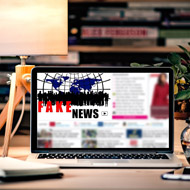Psychological ‘vaccine’ could protect against ‘fake news’

“The idea is to provide a cognitive repertoire that helps build up resistance to misinformation.”
‘Vaccinating’ the public against misinformation with legitimate facts could help to protect against ‘fake news’, according to new research.
The study, published in Global Challenges, is the first to test the ‘inoculation theory’ on a real world scenario.
In the study, researchers compared reactions to a well-known fact on climate change to a popular misinformation campaign.
They found that false material completely cancelled out the accurate statement in people’s minds, and opinions ended up back where they started.
Next, the team added a small dose of misinformation to the delivery of the fact, by briefly introducing people to distortion tactics.
The researchers found that this ‘inoculation’ helped to shift and hold opinions closer to the truth - despite follow-up exposure to ‘fake news’.
“Misinformation can be sticky, spreading and replicating like a virus,” says lead author Dr Sander van der Linden, a social psychologist from the University of Cambridge.
“We wanted to see if we could find a ‘vaccine’ by pre-emptively exposing people to a small amount of the type of misinformation they might experience. A warning that helps preserve the facts.
“The idea is to provide a cognitive repertoire that helps build up resistance to misinformation, so the next time people come across it they are less susceptible.”
Fossil fuel and tobacco companies have used the ‘inoculation’ method to sow seeds of doubt and to undermine scientific consensus in the public consciousness.
But the researchers say their research shows that such techniques can be partially “reversed” to promote scientific consensus and work in favour of the public good.
“What’s striking is that, on average, we found no backfire effect to inoculation messages among groups predisposed to reject climate science, they didn’t seem to retreat into conspiracy theories,” said van der Linden.
“There will always be people completely resistant to change, but we tend to find there is room for most people to change their minds, even just a little.”



 The Veterinary Medicines Directorate (VMD) is inviting applications from veterinary students to attend a one-week extramural studies (EMS) placement in July 2026.
The Veterinary Medicines Directorate (VMD) is inviting applications from veterinary students to attend a one-week extramural studies (EMS) placement in July 2026.